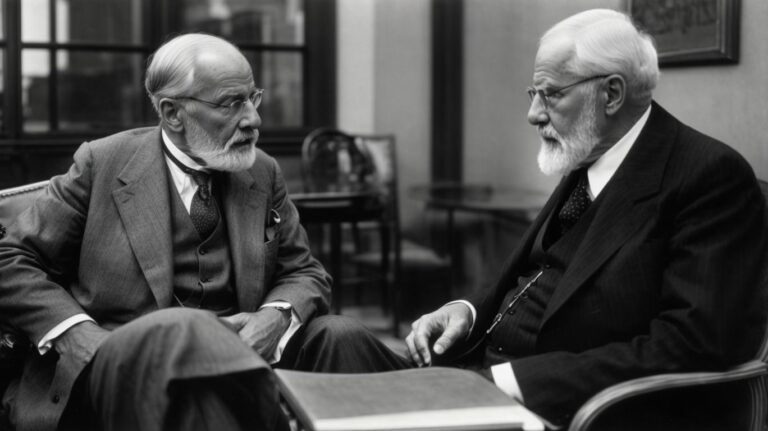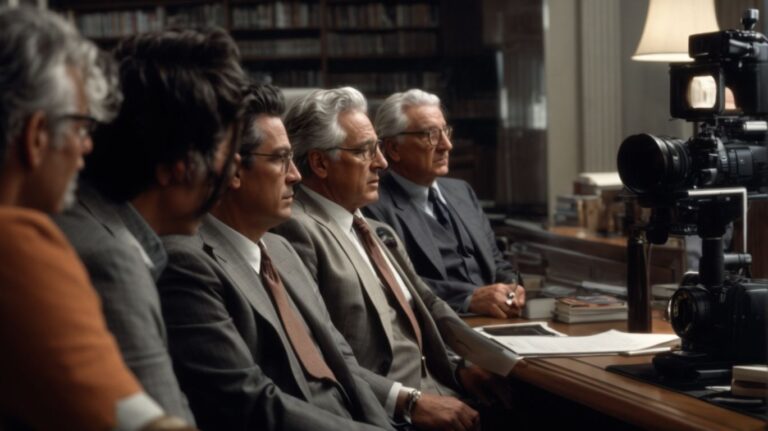Have you ever wondered about the origins of psychology and how it came to be the fascinating field it is today? In this article, we will explore the influence of older fields such as philosophy, biology, physiology, and anthropology on the creation of psychology. These disciplines have played a crucial role in shaping the study of the mind and behavior, human development, the connection between body and mind, and cultural influences on behavior.
Join us as we delve into the key figures who integrated these older fields into psychology, such as Wilhelm Wundt, William James, Sigmund Freud, and John B. Watson. We will also discuss how the influence of these older fields has shaped modern psychology, leading to the development of different schools of thought, the evolution of research methods, and the impact on modern psychological theories and concepts. Get ready to uncover the rich history and evolution of psychology through the lens of these older fields.
Contents
- 1 What are the Older Fields that Influence Psychology?
- 2 How do these Older Fields Contribute to the Creation of Psychology?
- 3 What are the Key Figures in the Integration of Older Fields into Psychology?
- 4 How has the Influence of Older Fields Shaped Modern Psychology?
- 5 Frequently Asked Questions
- 5.1 1. What are some examples of older fields that influenced the creation of psychology?
- 5.2 2. How did philosophy contribute to the creation of psychology?
- 5.3 3. What is the relationship between biology and psychology?
- 5.4 4. How did the field of physiology contribute to the development of psychology?
- 5.5 5. How have older fields continued to influence modern psychology?
- 5.6 6. In what ways has the influence of older fields on the creation of psychology been positive?
What are the Older Fields that Influence Psychology?
The evolution of psychology has been profoundly shaped by various older fields such as philosophy, biology, physiology, and anthropology, each contributing unique perspectives to the understanding of human behavior and mental processes.
Philosophy, as one of the oldest disciplines, laid the groundwork for psychological inquiry by diving into questions of consciousness, identity, and morality.
Biology introduced the concept of studying the brain and nervous system, sparking investigations into how biological processes influence behavior.
Physiology brought a scientific approach to understanding the physiological mechanisms underlying psychological phenomena, leading to the emergence of experimental psychology.
Anthropology’s focus on culture and social interactions enriched psychology’s understanding of how environmental factors shape human behavior and cognition.
Philosophy
Philosophy has long been intertwined with psychology, exploring fundamental questions about the nature of the human mind, consciousness, and behavior, with pioneers like Wilhelm Wundt bridging the gap between philosophy and early psychology.
This integration of philosophy and psychology can be traced back to ancient Greek thinkers like Aristotle and Plato, who pondered deeply on topics related to human behavior and cognitive processes. Their inquiries laid the groundwork for future psychological investigations into the workings of the mind.
Wilhelm Wundt, a German psychologist, is often hailed as the “Father of Psychology” for establishing the first experimental psychology laboratory in Leipzig, Germany, in 1879. His emphasis on empirical observation and scientific methodology marked a significant shift in the field, leading to the formalization of psychology as a distinct scientific discipline.
Biology
The intersection of biology and psychology delves into the evolutionary underpinnings of human behavior, exploring how fitness and neurobiological mechanisms shape mental processes and responses to the environment.
Evolutionary perspectives in psychology highlight how certain behaviors have become adaptive over time, aiding in survival and reproduction.
When diving into the intricate web of neurobiological influences on behavior, researchers often examine the role of neurotransmitters, hormones, and brain structures in shaping our thoughts and actions.
This interplay between biology and psychology is crucial in understanding human cognition, as it acknowledges the genetic predispositions that influence our cognitive functions and decision-making processes.
Physiology
Physiology’s impact on psychology can be seen through the study of behavioral responses, exemplified by Ivan Pavlov’s classical conditioning experiments that laid the groundwork for understanding the relationship between physiology and behavior.
These experiments showcased how the body’s physical processes, such as salivation in response to a bell ringing, could be influenced and even controlled by psychological stimuli. The idea that external cues could elicit automatic responses in living organisms revolutionized the field of psychology, leading to further research into the mechanisms underlying these connections.
Physiological responses could be trained and altered based on psychological triggers, highlighting the intricate link between the two disciplines. This interplay between physiology and psychology serves as a cornerstone for modern understanding of human behavior and the mind-body connection.
Anthropology
Anthropology contributes to psychology by examining the cultural and social influences that shape human behavior, offering insights into the diversity of psychological processes across different societies and contexts.
This interdisciplinary approach aids psychologists in understanding how individuals’ beliefs, values, and norms are influenced by their cultural backgrounds. By exploring various societies and their unique practices, anthropologists provide valuable information that helps psychologists tailor therapeutic approaches to suit diverse populations. Anthropological studies shed light on how environment, traditions, and societal structures impact mental health and emotional well-being. The rich data collected through anthropological research offers a deeper understanding of the complexities of human behavior and cognition, enhancing psychological theories and practices.
How do these Older Fields Contribute to the Creation of Psychology?
The integration of older fields such as philosophy, biology, physiology, and anthropology into psychology enriches our understanding of human development, behavior, and consciousness, providing diverse perspectives on the complexities of the mind.
Philosophy serves as the foundation by exploring fundamental questions about the nature of existence and knowledge, which underpin psychological theories.
Biology delves into the intricate workings of the brain, neurotransmitters, and genetics, shedding light on how physiological processes influence mental states.
Physiology offers insights into the link between bodily responses and emotions, unveiling the intricate connections between the physical body and psychological well-being.
Anthropology examines cultural variations in beliefs, customs, and practices, revealing how societal norms shape individual behaviors and thought patterns.
The Study of the Mind and Behavior
The study of the mind and behavior in psychology encompasses diverse perspectives ranging from humanistic psychology, emphasizing personal growth and self-actualization, to psychodynamic psychology, diving into unconscious thoughts and early life experiences.
Humanistic psychology views individuals as inherently good, focusing on their potential to grow and achieve fulfillment. This perspective emphasizes free will, the importance of personal choice, and the quest for authenticity and meaning in life.
On the other hand, psychodynamic psychology, founded by Freud, probes into the unconscious mind, childhood experiences, and the impact of unresolved conflicts on behavior. It delves into the complexities of emotions, desires, and memories that shape our perceptions and actions.
Understanding Human Development
Understanding human development in psychology involves exploring key theories such as Erik Erikson’s psychosocial stages and Jean Piaget’s cognitive development framework, shedding light on the psychological processes that occur across the lifespan.
While Erikson’s psychosocial model emphasizes the interplay between individuals and their social environment, Piaget’s cognitive stages highlight how intellectual abilities evolve over time through assimilation and accommodation. Vygotsky’s sociocultural theory underscores the role of cultural influences in shaping cognitive development.
These theories collectively emphasize the intricate interplay between social, cognitive, and emotional factors in shaping human growth and behavior. By understanding these frameworks, psychologists gain insights into the complexities of human development and how individuals navigate challenges and opportunities at different stages of life.
Exploring the Connection between Body and Mind
The exploration of the connection between body and mind in psychology spans from behaviorism’s focus on observable behaviors to the cognitive revolution’s emphasis on internal mental processes, highlighting the dynamic interplay between physical and psychological dimensions.
Behaviorism, pioneered by psychologists like John B. Watson and B.F. Skinner, viewed human behavior as a response to external stimuli, neglecting the intricate workings of the mind. In contrast, the cognitive revolution led by figures such as Ulric Neisser brought attention to the intricate processes of memory, perception, and problem-solving, reshaping how psychologists understood the human experience. These shifting perspectives paved the way for modern research that delves into the complexities of cognition, emotions, and behavior, influencing the development of innovative therapeutic approaches that target both the body and mind.
Examining Cultural and Social Influences on Behavior
Psychology’s examination of cultural and social influences on behavior encompasses research on the impact of diverse cultural practices, societal norms, and interpersonal relationships on individual and collective psychological experiences.
Cultural and social factors play an integral role in shaping how individuals perceive themselves and others, affecting their thoughts, emotions, and behaviors. Through cross-cultural research, psychologists can gain valuable insights into the diversity of human cognition and behavior across different populations. Examining how societal influences such as family dynamics, educational systems, and media exposure impact psychological processes sheds light on the intricate relationship between culture and mind. Understanding these complexities is essential for developing more inclusive and effective psychological theories and interventions.
What are the Key Figures in the Integration of Older Fields into Psychology?
Several key figures have played pivotal roles in integrating older fields into psychology, including Wilhelm Wundt, known as the father of experimental psychology, William James, a prominent philosopher-psychologist, Sigmund Freud, the founder of psychoanalysis, and John B. Watson, a behaviorism pioneer.
Wilhelm Wundt’s establishment of the first laboratory dedicated to psychology in 1879 ushered in a new era of scientific inquiry into the human mind.
William James’s seminal work “The Principles of Psychology” profoundly influenced the development of modern psychology, emphasizing the importance of the stream of consciousness and functionalism.
Freud’s psychoanalytic theory delved into the unconscious mind, bringing forth concepts like the id, ego, and superego, shaping the understanding of mental processes and behavior.
John B. Watson’s focus on observable behavior laid the foundation for behaviorism, emphasizing the role of environment and learning in shaping human actions.
Wilhelm Wundt
Wilhelm Wundt, a German psychologist and philosopher, established the first psychology laboratory at the University of Leipzig, pioneering the school of thought known as structuralism and advocating for empirical research in psychology.
His work laid the foundation for modern psychology by prioritizing the scientific study of human behavior and cognition. Through his emphasis on introspection as a method of studying mental processes, Wundt paved the way for a systematic approach to understanding the mind.
His focus on breaking down conscious experiences into their basic components, such as sensations and feelings, was revolutionary and formed the basis of structuralism, which aimed to uncover the structure of the human mind.
William James
William James, an American psychologist and philosopher, is known for his functionalist approach to psychology, emphasizing the adaptive functions of human consciousness and behavior in understanding mental processes.
His groundbreaking work in the late 19th and early 20th centuries revolutionized the field of psychology by shifting the focus from the structural components of the mind to the practical implications of mental functions.
James believed that understanding consciousness required looking at how it helps individuals adapt to their environment and navigate daily life challenges.
This functionalist perspective paved the way for a more holistic understanding of human behavior, highlighting the importance of studying the purpose and utility of mental processes rather than just their form.
Sigmund Freud
Sigmund Freud, the founder of psychoanalysis, revolutionized psychology by diving into the realm of unconscious thoughts, dreams, and inner conflicts, influencing subsequent figures like Carl Jung in the development of psychodynamic perspectives.
Freud’s theories centered around the idea that unconscious processes, such as desires and memories, greatly influence human behavior and mental health.
He believed that diving into one’s unconscious mind through methods like dream analysis could reveal underlying conflicts and motivations that shape an individual’s personality.
Freud’s psychodynamic approach highlighted the importance of childhood experiences and how they shape adult behaviors and relationships, laying the foundation for modern psychoanalytic therapy.
John B. Watson
John B. Watson, a pioneering behaviorist, laid the foundations of behaviorism in psychology, focusing on observable behaviors, conditioning processes, and stimulus-response mechanisms, influencing later behaviorists like B.F. Skinner.
Watson’s work was instrumental in shifting the focus of psychology from the study of the mind to overt behavior, making psychology more scientific and objective. His experimental methodologies, such as the famous ‘Little Albert’ experiment, demonstrated the principles of classical conditioning in a controlled laboratory setting, emphasizing the role of environment in shaping behavior.
The legacy of Watson’s behaviorism can be seen in modern approaches to studying human behavior, such as cognitive-behavioral therapy and applied behavior analysis, which continue to emphasize the importance of observable actions and environmental influences in understanding and changing behavior.
How has the Influence of Older Fields Shaped Modern Psychology?
The profound influence of older fields on psychology has shaped modern approaches to understanding human behavior, leading to the development of diverse schools of thought, advanced research methodologies, and a deeper exploration of neurobiological underpinnings.
These foundations, ranging from philosophy to biology, have provided a rich tapestry of ideas that have fundamentally impacted how psychologists analyze the mind and behavior.
-
As the field evolved, various schools of psychology emerged, such as behaviorism, psychoanalysis, and humanistic psychology, each offering unique perspectives on the complexities of human experience.
-
Advancements in research techniques, including brain imaging technologies and genetic studies, have allowed psychologists to delve deeper into the biological mechanisms influencing mental processes and behaviors.
The Development of Different Schools of Thought
The integration of older fields into psychology has led to the development of diverse schools of thought such as cognitive psychology, emphasizing mental processes, and humanistic psychology, focusing on personal growth and self-actualization.
One significant impact of integrating these fields is the enriched understanding of human cognition, behavior, and emotional well-being.
- Cognitive psychology delves into how people perceive, think, and problem-solve, shedding light on areas such as memory, decision-making, and language development.
- On the other hand, humanistic psychology highlights the importance of personal experiences, subjective feelings, and self-fulfillment in shaping individual behavior and mental health.
The Evolution of Research Methods
The integration of older fields has propelled advancements in psychological research methods, with pioneers like Gustav Fechner laying the groundwork for experimental psychology and the systematic study of mental processes.
Experimental psychology, as championed by Fechner, led to the establishment of controlled laboratory experiments where researchers could systematically test hypotheses and behaviors.
Advancements in observational techniques, such as naturalistic observations and case studies, provided a more holistic view of human behavior beyond the confines of controlled settings.
The fusion of these varied approaches, stemming from Fechner’s early contributions, has greatly influenced modern psychological research methodologies, allowing for a richer understanding of the complexities of the human mind and behavior.
The Impact on Modern Psychological Theories and Concepts
The integration of older fields into psychology has had a profound impact on shaping modern theories and concepts, such as evolutionary psychology, which explores the adaptive functions of psychological traits and behaviors in human evolution.
This integration demonstrates how insights from fields like anthropology, biology, and neuroscience enrich our understanding of human behavior.
By incorporating evolutionary principles and perspectives, psychologists can delve into deeper explanations for why certain psychological mechanisms and behaviors exist.
This interdisciplinary approach fosters a more holistic view of individuals, considering both genetic predispositions and environmental influences on our cognitive and emotional processes.
Frequently Asked Questions
1. What are some examples of older fields that influenced the creation of psychology?
Some of the older fields that have had a significant influence on the development of psychology include philosophy, biology, and physiology.
2. How did philosophy contribute to the creation of psychology?
Philosophy played a vital role in the creation of psychology as many early psychologists were also philosophers who studied the mind and behavior.
3. What is the relationship between biology and psychology?
Biology has greatly influenced the creation of psychology by providing insights into the physical structures and functions of the brain that affect behavior and mental processes.
4. How did the field of physiology contribute to the development of psychology?
Physiology, the study of the body’s functions, provided early psychologists with a way to measure and understand physiological responses to different stimuli, which helped shape the field of psychology.
5. How have older fields continued to influence modern psychology?
The influence of older fields such as philosophy, biology, and physiology can still be seen in modern psychology, as new advancements and discoveries are continually being made that build upon these foundational disciplines.
6. In what ways has the influence of older fields on the creation of psychology been positive?
The influence of older fields has been incredibly positive as it has allowed for the integration of diverse perspectives and approaches in psychology, leading to a more comprehensive understanding of human behavior and mental processes.





